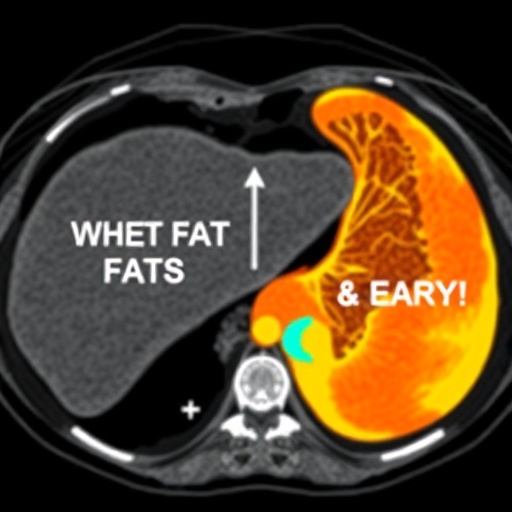PROTECT YOUR DNA WITH QUANTUM TECHNOLOGY
Orgo-Life the new way to the future Advertising by AdpathwayIn a significant stride towards understanding and addressing obesity, researchers have recently published a comprehensive study detailing the development and content evaluation of the Eating Behavior and Appetite Questionnaire (EBAQ). This innovative tool aims to provide insights into the complex interplay of factors influencing eating behaviors among individuals grappling with obesity. With obesity rates steadily rising globally, the need for effective measurement instruments like the EBAQ has never been more critical. The implications of such research extend beyond mere academic interest; they touch the very essence of public health, clinical interventions, and patient quality of life.
The EBAQ is strategically designed to delve deeper into the multifaceted aspects of eating behavior, tapping into psychological dimensions that traditional questionnaires may overlook. This newly developed instrument seeks to quantify the various components of appetite, including physiological, emotional, and cognitive factors. By shedding light on these variables, it aims to facilitate a more nuanced understanding of how individuals with obesity interact with food and their environment, paving the way for tailored interventions.
As obesity continues to be a major contributor to a host of health issues, including diabetes, cardiovascular diseases, and certain types of cancer, the relevance of the EBAQ cannot be overstated. The study highlights how individuals with obesity may not only struggle with physical health challenges but also face considerable emotional and psychological hurdles associated with their eating behaviors. The EBAQ can potentially serve as a vital resource for clinicians, helping them to devise more personalized treatment plans that take into account the unique needs and struggles of each patient.
The researchers employed a rigorous methodology in developing the EBAQ, ensuring that it is both reliable and valid across diverse populations. This involved multiple stages, including item generation, expert reviews, and pilot testing with various demographic groups. By incorporating feedback from a broad spectrum of participants, the EBAQ was refined to ensure clarity, relevance, and ease of use. This meticulous approach underscores the commitment of the researchers to create a tool that can stand the test of time and provide real value in clinical settings.
The content evaluation phase was particularly crucial, as it allowed the researchers to assess how well the EBAQ captures the key dimensions of eating behavior. This phase involved an extensive analysis of the responses collected from participants who completed the questionnaire. The findings revealed not only the reliability of the instrument but also highlighted areas where further refinement could enhance its effectiveness. This iterative process of evaluation is what distinguishes the EBAQ from many other behavioral assessment tools.
As part of its broader applicability, the EBAQ is designed to accommodate the diverse experiences of individuals with obesity. Recognizing that a one-size-fits-all approach is inadequate, the questionnaire incorporates various dimensions of eating behavior that reflect cultural, social, and psychological factors. This adaptability makes the EBAQ a valuable tool for researchers and clinicians worldwide who are looking to better understand the diverse experiences of those affected by obesity.
Ultimately, the success of the EBAQ lies in its potential for improving obesity treatment outcomes. By facilitating a deeper understanding of eating behavior, healthcare providers can better identify the root causes of their patients’ struggles with obesity. This targeted approach not only enhances the efficacy of interventions but also empowers individuals to take control of their eating habits and overall health journey. The EBAQ serves as a bridge between research and practice, transforming complex theoretical concepts into practical assessment tools that can be implemented in real-world settings.
Moreover, the EBAQ’s introduction comes at a time when there is a pressing need for innovative solutions in obesity management. As traditional methods fall short of achieving desirable outcomes, the emergence of comprehensive tools like the EBAQ represents a potential paradigm shift in how obesity is understood and treated. This research doesn’t just contribute to academic discourse; it lays the groundwork for more effective public health strategies and clinical practices that can ultimately reduce the burden of obesity on society.
In conclusion, the groundbreaking study on the Eating Behavior and Appetite Questionnaire marks an important milestone in obesity research. By providing a detailed and structured approach to understanding eating behaviors, the EBAQ equips healthcare professionals with the tools they need to better address the complexities of obesity. As the world continues to grapple with rising obesity rates, instruments like the EBAQ will play a pivotal role in fostering healthier eating habits and improving the overall quality of life for individuals affected by obesity.
In light of the pressing global health crisis posed by obesity, the collaborative efforts of researchers like Kanu, Clucas, and Skalicky in developing the EBAQ cannot be overstated. Their work not only demonstrates a commitment to advancing scientific understanding but also reflects the urgent need for practical solutions in the ongoing battle against obesity. As this innovative questionnaire gains traction, it is destined to have a profound impact on future research and clinical practices, offering hope and support for millions struggling with obesity.
In essence, as the EBAQ enters the field, it is poised to revolutionize our approach to eating behaviors, driving meaningful change in how obesity is addressed and treated. The implications of this research extend far beyond the confines of academia, promising a future in which individuals are better equipped to navigate their eating behaviors, ultimately leading to healthier lifestyles and improved well-being.
Subject of Research: Eating Behavior and Appetite Questionnaire (EBAQ) for Individuals with Obesity
Article Title: Development and Content Evaluation of the Eating Behavior and Appetite Questionnaire (EBAQ) for Individuals with Obesity
Article References:
Kanu, C., Clucas, C., Skalicky, A. et al. Development and Content Evaluation of the Eating Behavior and Appetite Questionnaire (EBAQ) for Individuals with Obesity.
Adv Ther (2025). https://doi.org/10.1007/s12325-025-03386-2
Image Credits: AI Generated
DOI: https://doi.org/10.1007/s12325-025-03386-2
Keywords: obesity, eating behavior, appetite questionnaire, clinical interventions, public health
Tags: appetite influencing factorsclinical implications of eating behaviorcomprehensive obesity assessment toolsEating Behavior and Appetite Questionnairenutritional psychology researchobesity and chronic diseasesobesity intervention strategiespsychological aspects of eatingpublic health and obesitytailored interventions for obesitytools for measuring eating habitsunderstanding obesity research


 5 hours ago
7
5 hours ago
7





















 English (US) ·
English (US) ·  French (CA) ·
French (CA) ·